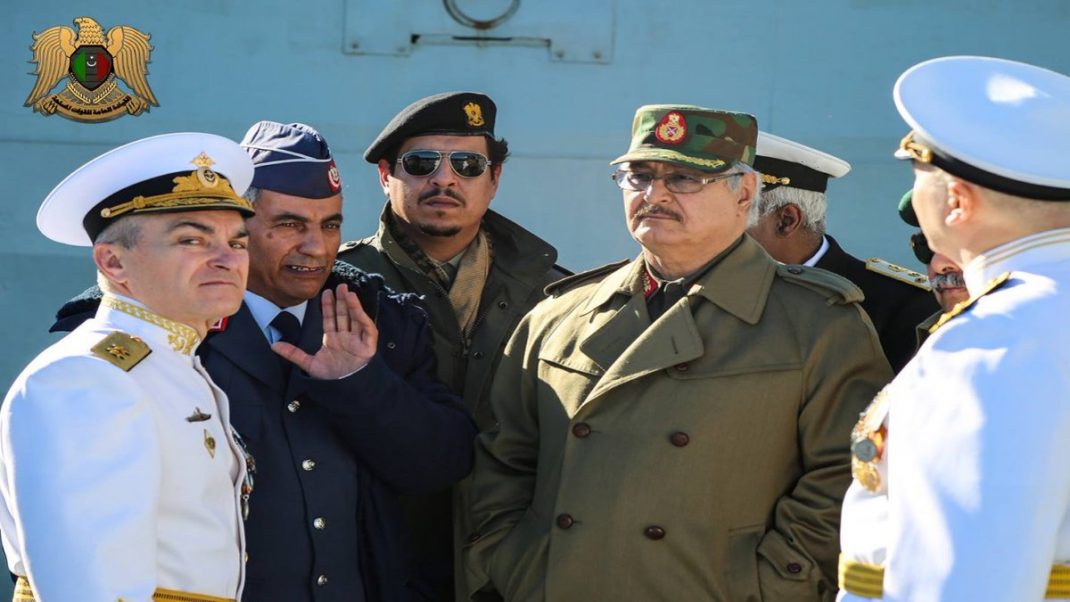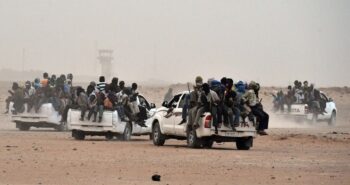John C.K. Daly
Fresh from its successes in Syria, Russia is turning its attention to another country riven by the “Arab spring” — Libya.
The Russian Navy hosted Libyan National Army (LNA) Field Marshal Khalifa Haftar on board its Admiral Kuznetsov aircraft carrier, which is returning to northern Russia following a deployment in Syria. On January 11th, Haftar inspected an honour guard, watched flight operations by the ship’s Sukhoi Su-33 fighter jets and spoke via video link with Russian Defence Minister Sergei Shoigu.
The gesture was hardly spontaneous. Haftar visited Russia last June to discuss a number of issues, including possible weapons deliveries, with Shoigu and Russian Security Council Secretary Nikolai Patrushev. Three months later, Haftar requested that Russia end its arms embargo and supply weapons and military equipment to his forces, delivering his request to Russian President Vladimir Putin and Shoigu via his special representative Abdelbaset al-Badri, then serving as Libya’s ambassador to Saudi Arabia.
When asked whether he was promised arms during his follow-up November visit to Russia, Haftar coyly said Moscow had told him weapons “can arrive only once the (UN) embargo ends” but that he was assured that “Putin will undertake to revoke it”.
Haftar’s interest in Russian armaments has apparently moved from rhetoric to reality. A January 16th report in Al-Arab newspaper stated that, while on the Admiral Kuznetsov, Haftar signed a contract with the Russian government for $2 billion in weaponry for his self-proclaimed army.
For the international community, which supports the Tripoli-based Government of National Accord (GNA), the key question is whether Russia’s deepening involvement in Libya will help pacify the country or increase its division. As long as Haftar believes he has the unconditional support of Russia and possibly of the new administration in the United States, he will not have any interest in taking part in political negotiations being brokered by the United Nations, which supports the GNA.
For its part, Russia sees political stabilisation in the Middle East and North Africa (MENA) region as an integral component in its own struggle with terrorism. On January 16th Patrushev stated that in 2016 Russia prevented more than 900 foreign terrorists from entering the country and that the threat had increased because of not only continuing unrest in Syria but also due to the developments in Iraq, Libya and Afghanistan. Russia notes approvingly that Haftar, backed by Egypt, is seeking to exclude Islamists from political negotiations while pursuing the independence of the military from government control.
At the onset of the “Arab spring” in 2011, Russia took a cautious back seat when NATO, backed by several Middle Eastern powers, deployed air power to depose dictator Muammar Qaddafi. Moscow quickly came to regret its neutrality; in April that year, Putin described the NATO bombing campaign as a “medieval call for a crusade”. Since then, Russia has watched from the sidelines as the country slid into civil war before developing its relationship with Haftar.
Russia’s Syrian intervention and growing involvement in Libya dovetail with the government’s foreign-policy agenda, promulgated in 2013 and then codified in December. It notes: “The growing threat of international terrorism is one of the most dangerous realities in today’s world. The spread of extremist ideology and the activity of terrorist groups in a number of regions (primarily, in the Middle East and North Africa) are the result of systemic development problems that globalisation processes have laid bare.”
Reduced to its essence, an imperfect centralised government is preferable to a power vacuum that allows extremism to flourish. It is this rationale that underpins Moscow’s Middle Eastern policies.
Moscow’s stance may soon put it at loggerheads with many Western powers, with both the United States and European Union having granted diplomatic recognition to the GNA, something Russia has refused to do. Given Haftar’s policy of denying Islamists political participation, it seems likely that he will enjoy Russian support for the foreseeable future.
***
John C.K. Daly is a Washington-based specialist on Russian and post-Soviet affairs.
________________




